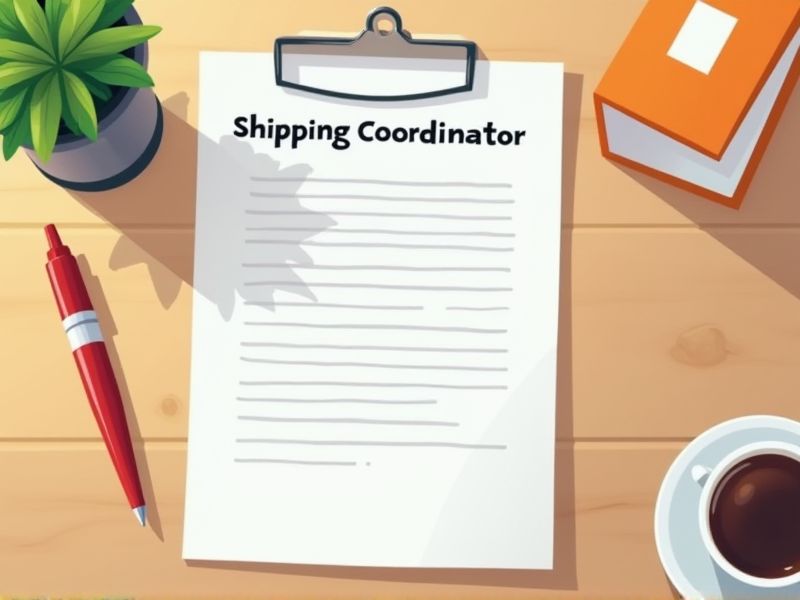
A Shipping Coordinator plays a crucial role in logistics, managing the transport of goods efficiently and legally. Without the right certifications, they risk non-compliance with regulations and operational mishaps. These credentials ensure they are equipped with the knowledge to handle complex shipping protocols and international trade requirements. Here are some essential certifications to consider for a Shipping Coordinator position.
Certified Supply Chain Professional (CSCP)
Companies face growing complexities in global trade, and a Certified Supply Chain Professional (CSCP) equips a Shipping Coordinator with specialized knowledge to navigate these challenges. This certification helps ensure efficiency and effectiveness in supply chain operations, reducing delays and associated costs. A CSCP credential enhances a Shipping Coordinator's ability to optimize inventory and manage supplier relationships, critical for timely deliveries. It also boosts credibility, making professionals more valuable to organizations focused on robust supply chain performance.
Certified in Transportation and Logistics (CTL)
Becoming Certified in Transportation and Logistics (CTL) equips a Shipping Coordinator with advanced knowledge of supply chain processes, enhancing efficiency in managing shipments. This certification validates expertise in logistics, often leading to more streamlined operations and reduced costs. CTL credentials are recognized by employers, potentially increasing job prospects and career advancement opportunities. The certification ensures compliance with industry standards, fostering trust and reliability within the logistics network.
Certified in Production and Inventory Management (CPIM)
Obtaining a Certified in Production and Inventory Management (CPIM) certification equips shipping coordinators with comprehensive knowledge of production and inventory processes, enhancing efficiency in managing supply chains. Proficiency in these areas translates to improved accuracy in managing stock levels, reducing costly discrepancies and delays. Understanding production workflows allows shipping coordinators to anticipate potential bottlenecks, leading to smoother logistics operations. Employers often regard CPIM-certified professionals as more credible and adept at strategic decision-making, increasing job prospects and career advancement opportunities.
Certified Transportation Professional (CTP)
A Certified Transportation Professional (CTP) offers a standardized level of expertise, increasing efficiency in the complex logistics tasks handled by Shipping Coordinators. The CTP credential ensures a deep understanding of regulations and compliance, reducing the likelihood of operational errors and potential penalties. This certification demonstrates a commitment to professional development, enhancing a Shipping Coordinator's credibility in the industry. Clients and employers often prefer working with someone certified, which can lead to better job opportunities and increased trust in logistical planning.
IATA Dangerous Goods Regulations Certification
IATA Dangerous Goods Regulations Certification ensures a Shipping Coordinator understands the requirements for safe handling and transportation of hazardous materials, minimizing risks of accidents during transit. Regulatory compliance is mandatory in the aviation industry, and possessing this certification verifies a coordinator's knowledge of international standards. Properly certified coordinators can help reduce legal liabilities associated with the transport of dangerous goods. This certification enhances operational efficiency and safety by equipping coordinators with the expertise to handle complex logistical challenges.
Customs Compliance Certification
Customs Compliance Certification helps shipping coordinators understand and adhere to international trade regulations, minimizing the risk of costly penalties. It ensures accurate documentation, facilitating smoother customs clearance and reducing shipment delays. Knowledge from certification allows coordinators to proactively address compliance issues, enhancing operational efficiency. Certification also builds credibility, fostering trust with clients and partners in global trade.
Certified Export Specialist (CES)
A Certified Export Specialist (CES) enhances a Shipping Coordinator's ability to navigate complex international trade regulations wisely. This certification equips the professional with updated knowledge about export compliance, reducing the risk of costly legal issues. Mastery from the CES program can improve documentation accuracy, mitigating potential shipment delays. The specialized skills gained allow for better management of tariffs and duties, ensuring cost efficiencies in shipping operations.
Hazardous Materials (HAZMAT) Certification
Hazardous Materials (HAZMAT) Certification is necessary for a Shipping Coordinator to ensure compliance with government regulations, reducing the risk of legal penalties. Proper certification equips the coordinator with knowledge on safe handling and transportation of dangerous goods, minimizing the risk of accidents. Understanding HAZMAT protocols helps in accurate documentation and labeling, preventing shipment delays. Certification also enhances the coordinator's ability to respond effectively to emergencies involving hazardous materials, protecting public safety and company reputation.
Lean Six Sigma Yellow Belt Certification
Earning a Lean Six Sigma Yellow Belt Certification equips a Shipping Coordinator with essential skills to identify and address inefficiencies in shipping processes. With this certification, a Shipping Coordinator gains a foundational understanding of process improvement, leading to more cost-effective operations. Enhanced problem-solving abilities help in reducing shipping errors, thus increasing customer satisfaction. By applying Lean Six Sigma principles, Shipping Coordinators contribute to faster delivery times, improving overall logistical performance.
OSHA 10 Certification
The OSHA 10 Certification enhances a Shipping Coordinator's understanding of safety protocols, reducing workplace accidents. This training ensures compliance with legal standards, minimizing the risk of regulatory penalties. Acquiring this certification also boosts a coordinator's credibility, making them more attractive to employers. It fosters a culture of safety within the shipping department, potentially improving overall productivity.
Summary
When you, as a Shipping Coordinator, obtain certifications, your career prospects can significantly improve due to enhanced credibility and recognition in your field. Employers often prioritize certified professionals, leading to increased job security and opportunities for advancement. Certification equips you with advanced skills, translating into improved efficiency and accuracy in logistics operations. The mastery of industry standards also enables you to navigate complex shipping regulations, fostering smoother supply chain processes.
